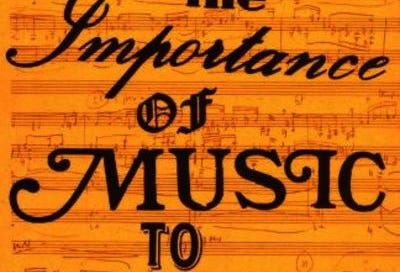The Importance of Music to Girls By Lavinia Greenlaw
I reviewed Lavinia Greenlaw's 'memoir' 'The Importance of Music to Girls' in 2007. It seems that I didn't like it much.
The Importance of Music to Girls
By Lavinia Greenlaw
(Faber & Faber, £16.99stg hardback)
This memoir (it declares itself as such on the garishly Day-Glo, suggestively punky, bright orange cover, so that’s what it must be), despite its ostensible does-exactly-what-it-says-on-the-tin title, could be had up under the Trade Descriptions Act.
First and foremost, one comes away still wondering about how important music is to girls, leading one to speculate that the title is intended as an exploratory interrogative rather than a declaratory statement. But then, where’s the question mark?
Secondly, as with most memoirs, the book is not really about music per se, as about its role in Lavinia Greenlaw’s personal development, and her evolving appreciation of it. Even then, music is not the main focus, so much as the friends and fashions that surround it, so that she could just as well have titled her book The Importance of Short Plaid Skirts to Girls, or The Importance of Haircuts to Girls, because it is the girl and not the music that makes the most noise.
Which leads, last but not least, to my third gripe: the book is really about the importance (or lack of it) of music (or whatever) to this particular girl, rather than girls in general. While she does make reference to her thirteen-year-old gang of girlfriends, we don’t get the impression that music means any more to them than it does to the pubescent Ms. Greenlaw. She even trumpets this singularity herself, since after her brief infatuation with Donny Osmond bites the dust and she sees The Sex Pistols on telly, she decides, ‘After three years of trying to fit in, I liked the idea of being different.’ Furthermore, the implication that music is experienced quite differently by girls than by boys is never satisfactorily delineated. The male protagonist of Joe Jackson’s pop ditty ‘It’s Different For Girls’ was being ironic, after all.
All in all, one can only surmise that Greenlaw, a poet of some standing, sold the publisher the title and a one-page proposal, and then had to find a way of delivering it.
Granted, this is a perennial problem with books which purport to be about the author and something-else-as-well, be it fly fishing, stamp collecting, or traveling around Ireland with a fridge. With arts related material, they are pitched halfway between memoir and criticism, so where does the balance lie? What we usually get is an autobiographical spurge intended to demonstrate how the writer arrived at the uniquely insightful and sublime sensibility which is now dispensing their invariably half-baked opinions.
The trouble with the This-is-how-this-song-made-me-feel-the-first-time-I-heard-it school, popular with non-professional music writers and, sadly, quite a lot of professional ones too, is that it eschews the rigors of close compositional reading, listening and interpretation, or analysis of the broader socio-cultural context and impact, leading literate non-partisan bystanders to conclude that all rock journalism is rubbish. However, it is possible to write intelligently about popular culture in general and rock music in particular, as practitioners as diverse as Greil Marcus and Ian MacDonald have shown.
In many ways, Nick Hornby’s High Fidelity, a useful point of comparison even if it is a novel, is the polar opposite of Greenlaw’s highly subjective treatment, since it was much better on the music than it was in its rather banal study of contemporary males’ aversion to commitment (the unstated, and so unexamined, assumption here being that commitment, preferably to a woman, and even better still to a family and household, is an undiluted ‘good thing’, and really just what most blokes need to sort themselves out). Of course, it could be argued that this is merely a further example of the different ways music is apprehended by males and females, but somehow I don’t buy this strict gender division. Ultimately, in the guise of trying to strike a chord with millions of readers, primarily of the same sex as themselves, both of these writers are really just talking about themselves.
The above strictures aside, the personal approach would be fine if Greenlaw were only somehow more passionate in her musings on music. Instead, potentially pivotal moments and shared experiences, which thousands of readers who would probably buy the book on the strength of its title alone could surely relate to, e.g. listening to John Peel’s radio show alone in your bedroom, seeing Ian Curtis perform with Joy Division, are all subsumed into and made subservient to Greenlaw’s frankly not very interesting and certainly not at all unusual Essex girl adolescence. It is safe to assume that, despite the portentousness of that misleading title, young Lavinia was much more at home on the balcony than in the mosh pit.
So, is it nerdy to like/be obsessive about (delete according to subjective stance) music (or, by extension, anything)? Are women less obsessive than men, because they ‘grow out’ of things, i.e. grow up, sooner? I remain unconvinced. Music is simply far too important – to this boy at least, and to some girls I know too – to be written about in this solipistically dilettantish way, which, given the incendiary nature of much of the material, remains remarkably pedestrian and unengaging.
First published in The Sunday Independent




